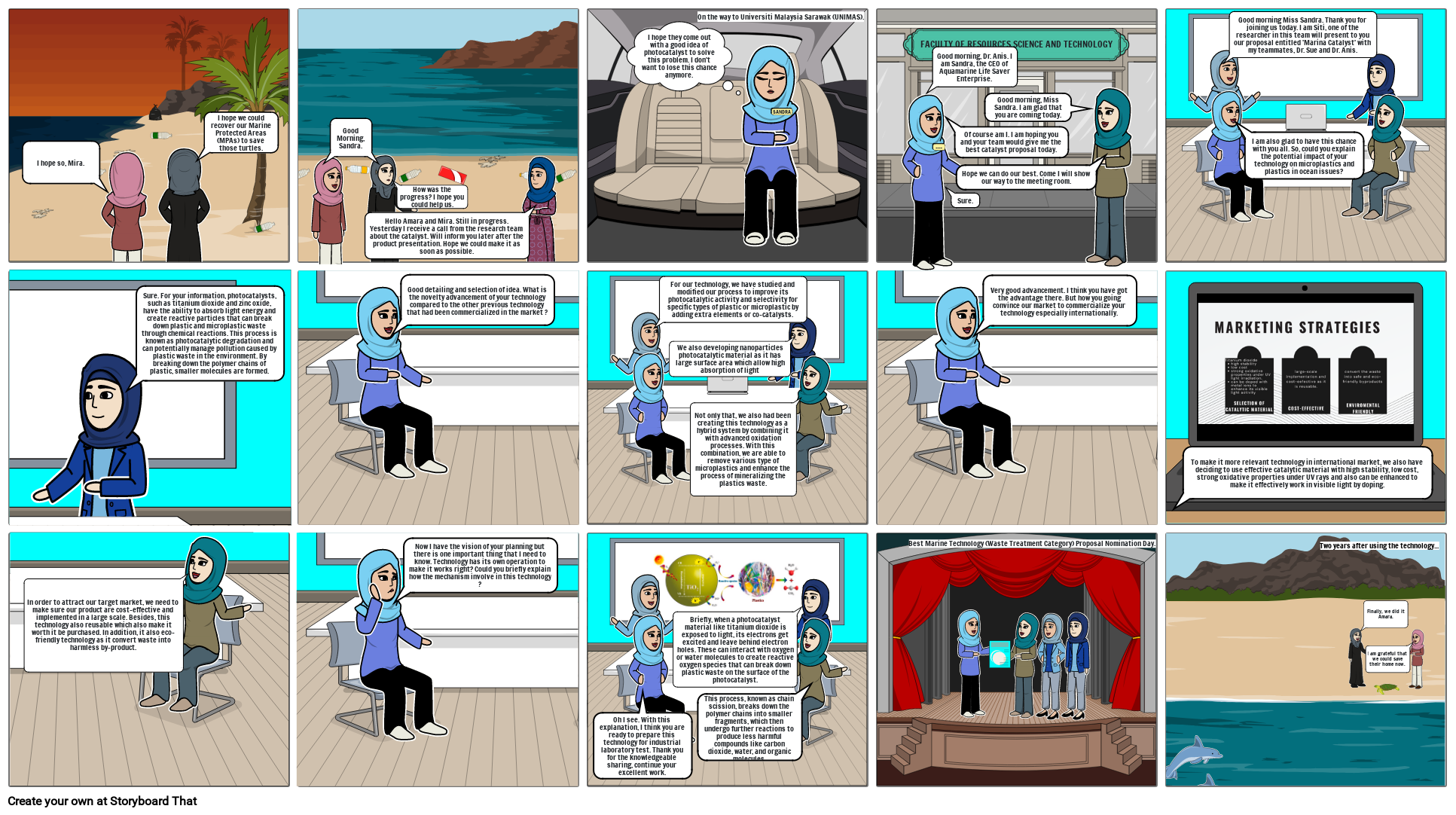FRONTIERS

Texto del Guión Gráfico
- I hope so, Mira.
- SANDRA
- I hope we could recover our Marine Protected Areas (MPAs) to save those turtles.
- Good Morning, Sandra.
- Hello Amara and Mira. Still in progress. Yesterday I receive a call from the research team about the catalyst. Will inform you later after the product presentation. Hope we could make it as soon as possible.
- How was the progress? I hope you could help us.
- I hope they come out with a good idea of photocatalyst to solve this problem. I don't want to lose this chance anymore.
- On the way to Universiti Malaysia Sarawak (UNIMAS).
- FACULTY OF RESOURCES SCIENCE AND TECHNOLOGY
- Good morning, Dr. Anis. I am Sandra, the CEO of Aquamarine Life Saver Enterprise.
- ---
- Of course am I. I am hoping you and your team would give me the best catalyst proposal today.
- Sure.
- Hope we can do our best. Come I will show our way to the meeting room.
- Good morning, Miss Sandra. I am glad that you are coming today.
- Good morning Miss Sandra. Thank you for joining us today. I am Siti, one of the researcher in this team will present to you our proposal entitled 'Marina Catalyst' with my teammates, Dr. Sue and Dr. Anis.
- I am also glad to have this chance with you all. So, could you explain the potential impact of your technology on microplastics and plastics in ocean issues?
- Sure. For your information, photocatalysts, such as titanium dioxide and zinc oxide, have the ability to absorb light energy and create reactive particles that can break down plastic and microplastic waste through chemical reactions. This process is known as photocatalytic degradation and can potentially manage pollution caused by plastic waste in the environment. By breaking down the polymer chains of plastic, smaller molecules are formed.
- Good detailing and selection of idea. What is the novelty advancement of your technology compared to the other previous technology that had been commercialized in the market ?
- For our technology, we have studied and modified our process to improve its photocatalytic activity and selectivity for specific types of plastic or microplastic by adding extra elements or co-catalysts.
- Not only that, we also had been creating this technology as a hybrid system by combining it with advanced oxidation processes. With this combination, we are able to remove various type of microplastics and enhance the process of mineralizing the plastics waste.
- We also developing nanoparticles photocatalytic material as it has large surface area which allow high absorption of light
- Very good advancement. I think you have got the advantage there. But how you going convince our market to commercialize your technology especially internationally.
- To make it more relevant technology in international market, we also have deciding to use effective catalytic material with high stability, low cost, strong oxidative properties under UV rays and also can be enhanced to make it effectively work in visible light by doping.
- In order to attract our target market, we need to make sure our product are cost-effective and implemented in a large scale. Besides, this technology also reusable which also make it worth it be purchased. In addition, it also eco-friendly technology as it convert waste into harmless by-product.
- Now I have the vision of your planning but there is one important thing that I need to know. Technology has its own operation to make it works right? Could you briefly explain how the mechanism involve in this technology ?
- Oh I see. With this explanation, I think you are ready to prepare this technology for industrial laboratory test. Thank you for the knowledgeable sharing, continue your excellent work.
- This process, known as chain scission, breaks down the polymer chains into smaller fragments, which then undergo further reactions to produce less harmful compounds like carbon dioxide, water, and organic molecules.
- Briefly, when a photocatalyst material like titanium dioxide is exposed to light, its electrons get excited and leave behind electron holes. These can interact with oxygen or water molecules to create reactive oxygen species that can break down plastic waste on the surface of the photocatalyst.
- Best Marine Technology (Waste Treatment Category) Proposal Nomination Day.
- Two years after using the technology...
- I am grateful that we could save their home now.
- Finally, we did it Amara.
Más de 30 millones de guiones gráficos creados

